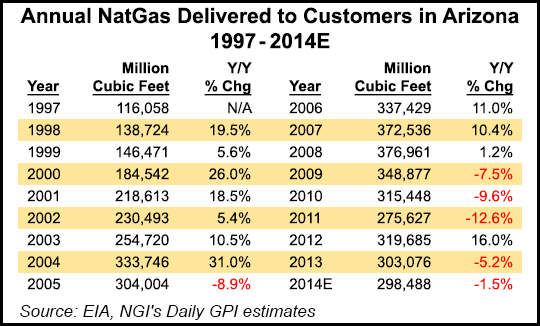Arizona Amends Gas Pipeline Rules, Considers More Capacity
Arizona regulators recently agreed to amend the state’s pipeline safety rules to align them with the latest federal standards.

The Arizona Corporation Commission’s (ACC) pipeline rule changes now must go through vetting by the state Attorney General’s Office. The commission will hold a public hearing and take comments on the changes, which are mostly technical and wording revisions, in June. A public comment hearing is set for June 18.
Separately, the ACC was assured of adequate natural gas supplies for the rest of this year and plans for increasing interstate capacity and services in the future.
Executives from Kinder Morgan’s El Paso Pipeline Co. and Energy Transfer’s Transwestern Pipeline Co. painted a fairly rosy supply picture for the state, which serves as a corridor for the two interstate pipelines’ more historically robust gas markets in California.
El Paso’s Kevin Johnson, western regional director for pipeline management, told the ACC members that his company continues to “aggressively pursue” options for creating some long-desired gas storage in the Phoenix metropolitan area. Johnson, also said capacity additions through additional compression and pipeline looping were in the offing for parts of the El Paso system in Arizona.
In noting that El Paso has access to three supply area storage fields, Johnson said ideally “it would be best to have something in the [Phoenix] market area,” adding that “we continue to aggressively pursue Arizona gas storage, which would help us not only from an operational standpoint, but would help when winter demands elsewhere reduce supplies available for the West, along with hourly services and renewables.”
In recent years, increased supplies have been flowing out of the Permian Basin, which along with the San Juan Basin, provides the bulk of the supplies for Arizona. The recent oil price decline has slowed the growth of associated gas in the Permian, Johnson said, adding that there are capacity increases that could be made, particularly on the El Paso south mainline system.
Transwestern’s Steven Hearn, senior director for marketing and business development, said his pipeline’s supplies and capacity out of the San Juan Basin are on target to serve all the anticipated demand in Arizona this summer. The company serves about half of Arizona’s gas-fired power generation load off its Phoenix lateral.
“Transwestern continues to provide reliable service with no major outages over the last number of years,” Hearn said. “We continue to add infrastructure — not just like the New River Compressor Station — but also all of our interconnects with major power plants and gas utilities, and we’re increasing services on the Phoenix side of our system with things like hourly peaking service.”
El Paso’s Johnson also told the Arizona regulators that between now and 2020 there is an option for increasing the north-south transfers on the laterals between the interstate pipeline’s north and south mainlines traversing the state. Upgrade work now ongoing to increase capacity for exports to Mexico could be tapped for dropping off gas to customers in the Phoenix and Tucson metropolitan areas, he said.
The Mexico work is scheduled to enter service in stages over the next five years. Johnson said. “We will have the ability if customers so desired and needed more of the north-south capacity to expand that transfer in the Havasu lateral crossover.” Current limitations in the south mainline, particularly in the winter, can “easily” be eliminated with a combination of additional compression and looping, he said.
© 2024 Natural Gas Intelligence. All rights reserved.
ISSN © 1532-1231 | ISSN © 2577-9877 | ISSN © 1532-1266 |
